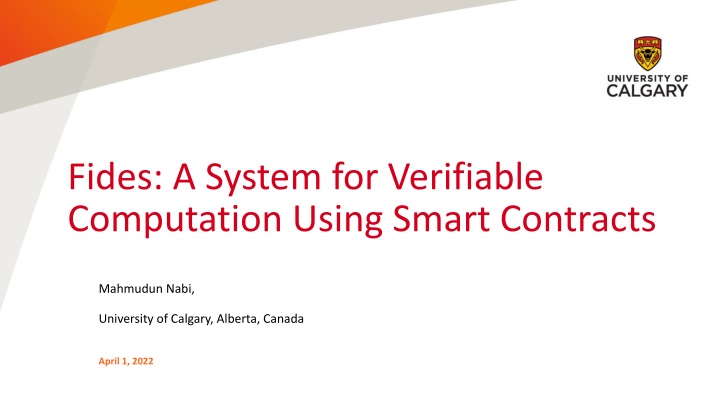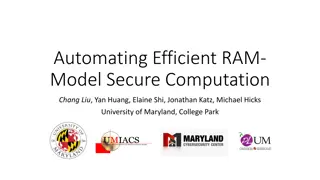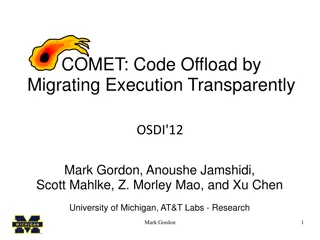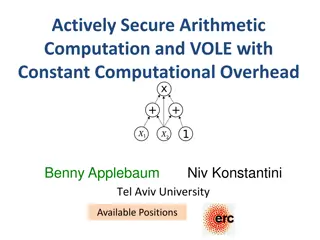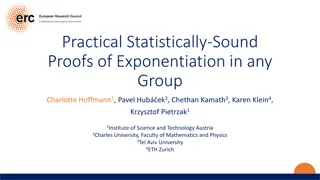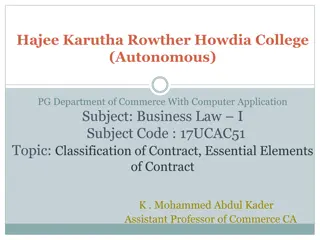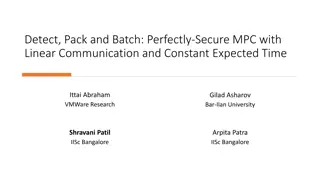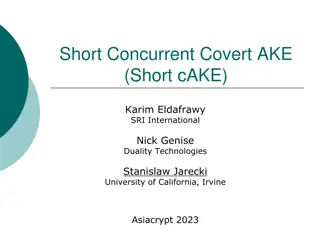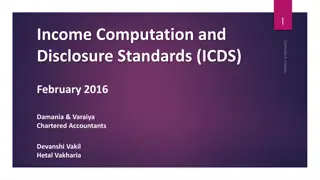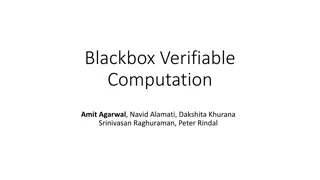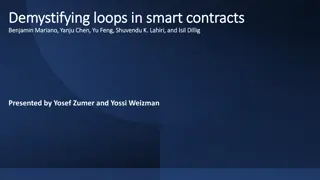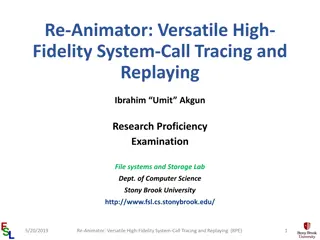Fides: A System for Verifiable Computation Using Smart Contracts
Fides presents a system for verifiable computation using smart contracts, focusing on blockchain basics, Ethereum, smart contracts, and outsourcing computation. It explores key components of blockchain, Ethereum's decentralized computing platform, properties of smart contracts, and the concept of verifiable outsourcing to ensure computation correctness. The work emphasizes transparency, immutability, and efficiency in computation verification.
Download Presentation

Please find below an Image/Link to download the presentation.
The content on the website is provided AS IS for your information and personal use only. It may not be sold, licensed, or shared on other websites without obtaining consent from the author.If you encounter any issues during the download, it is possible that the publisher has removed the file from their server.
You are allowed to download the files provided on this website for personal or commercial use, subject to the condition that they are used lawfully. All files are the property of their respective owners.
The content on the website is provided AS IS for your information and personal use only. It may not be sold, licensed, or shared on other websites without obtaining consent from the author.
E N D
Presentation Transcript
Fides: A System for Verifiable Computation Using Smart Contracts Mahmudun Nabi, University of Calgary, Alberta, Canada April 1, 2022
Outline Backgrounds Blockchain Ethereum and smart contract Outsourcing computation Refereed Delegation of Computation (RDoC) Verifiable Computation using Smart Contracts Our Work Committed CRR (cmCRR) protocol Fides Conclusion
Blockchain Basics Blockchain Basics Key Components of Blockchain: Consensus Transaction Node Block - Transaction data is permanently recorded in files called blocks. - To add a new block to the blockchain, all participating nodes must come to a common agreement (also called consensus). - A cryptographically signed piece of instruction that is generated by a node and submitted to the blockchain. - Full node - Mining node (aka miner) - Lightweight node Forming blockchain: by chaining blocks Key Characteristics: - Decentralization - Anonymity - Transparency - Immutability Figure: Example of forming blockchain 3
Ethereum Ethereum Ethereum: An open source, decentralized computing platform Enables users to develop smart contracts and decentralized applications (DApps). Key terms Peer-to-peer network of computers Accounts externally owned accounts (EOA) contract accounts Consensus algorithm Ethereum Virtual Machine (EVM) Smart contract Gas Digital currency: Ether 4
Smart contracts Smart contracts Properties Code Execution Executable code Correctness Transparency Immutability triggered by the transactions added to the blockchain stored on the Ethereum blockchain Gas Unit of Execution Gas limit Max. amount of gas a transaction or block may consume Bytecode Solidity Instruction set for execution inside EVM Language for Ethereum smart contract 5
Outsourcing computation using Smart Contract
Outsourcing Computation Verifiable outsourcing: Efficiently verify the correctness of a computation result that is provided by the cloud. 7
Verifiable Outsourcing Verifiable Outsourcing (Existing approaches against malicious adversary) (Existing approaches against malicious adversary) Using cryptography: Probabilistic checkable proofs [Kil92, Mic00] Homomorphic Encryption [GGP10, CKV10, AIK10] Expensive computation, inflexible Outsourcing by replication: Outsource the computation to a number of clouds. Select a solution that is generated by the majority of the clouds as the correct solution. Verifiable outsourcing using two clouds (Canetti, Rothblum and Riva [CRR11]) [Kil92] Joe Kilian. A note on efficient zero-knowledge proofs and arguments (extended abstract). STOC, 92 [Mic00] Silvio Micali. Computationally sound proofs. SIAM Journal on Computing, 2000. [GGP10] Gennaro, R., Gentry C., and Parno B. Non-interactive verifiable computing: outsourcing computation to untrusted workers, CRYPTO 10. [CKV10] Chung K.M., Kalai Y., and Vadhan S. Improved delegation of computation using fully homomorphic encryption, CRYPT 10 [AIK10] Applebaum B., Ishai Y., and Kushilevitz E.: From secrecy to soundness: efficient verification via secure computation. ICALP 10 [CRR11] Canetti, R., Riva, B., & Rothblum, G. N.: Practical delegation of computation using multiple servers, CCS 11 8
Refereed Delegation of Computation (RDoC) CRR (Canetti, Rothblum and Riva, CCS 11) [1] Cloud 1 ? y1 = y2 Cloud 2 y1 = y2 Correct answer- Accept Strength: - Provable security Play refereed game - Identify malicious cloud - binary-search - verify-reduced-step y1 = y2 Weakness: - Client is trusted 9 [1] Canetti, R., Riva, B., & Rothblum, G. N.: Practical delegation of computation using multiple servers , CCS 11
Smart contract as TTP Goals: Guarantee correctness Manage interaction between parties Managing the payments Avizheh et al. (ACM CCSW 19) [2] Verifiable Computation using Smart Contracts 10 [2] Avizheh, S., Nabi, M., Safavi-Naini, R., Venkateswarlu K, M.: Verifiable computation using smart contracts , CCSW 19
scCRR[2] Verifiable Computation using Smart Contracts Cloud 1 Request computation Collect result Cloud 2 Verify result Assumptions: - Client is untrusted. - One of the clouds is malicious and the other is rational. Problem: Copy Attack 11 [2] Avizheh, S., Nabi, M., Safavi-Naini, R., Venkateswarlu K, M.: Verifiable computation using smart contracts , CCSW 19
Copy Attack EVM EVM EVM EVM EVM Cloud 1 s result 1. Cloud 1 sends f(x) to smart contract. Cloud 2 s result EVM Cloud 1 EVM EVM Cloud 2 2. Cloud 2 sees f(x); copies f(x) and sends as its result it to the network. 3. All Ethereum nodes see two identical values from two clouds. The result is accepted as correct. 12
Our Contribution Committed CRR (cmCRR) protocol Outline of our SC-aided RDoC scheme using two servers Security and privacy analysis Fides Proof of concept implementation of cmCRR Evaluations 14
Committed CRR (cmCRR) Protocol Client ? has function ? and input ?, servers ?? and ?? receive ? and ?, and compute ?(?) and return output ?? and ?? to referee contract ??. Phase 1: - Computation initialization and server registration Initialization: 15
cmCRR Protocol (cont..) Phase 2: Execution and result comparison Computation: 16
cmCRR Protocol (cont..) Phase 3: - Binary search and single-step execution Dispute Resolution: 17
Security and Privacy Security Correctness Soundness Copy Detection Theorem: Let ? be a collision resistant hash function and ??????() be a hiding and binding commitment scheme, then cmCRR protocol provides protection against copy attack during: (i) the computation stage where the results are published, and (ii) the binary search stage where the challenge-response is run. Privacy Input privacy 18
Proof-of-concept implementation Fides Implements cmCRR Protocol Follows Ethereum execution model Actors: Client Two Servers Referee Challenges and Design Choices Single-step execution on Ethereum network Solidity language for delegated program Private EVM execution by servers Deterministic execution of delegated program Exclude non-deterministic EVM instructions 20
Fides Overview Functions: Client functions Server functions Referee SC Smart contract development: Language: Solidity Compiler: Remix Blockchain setup: Ganache Figure: Overview of Fides 21
Evaluation Goals: measure the execution cost of the delegated program by a server. measure the financial cost of verification by the referee contract on Ethereum network Table: Cost analysis of Fides. Left side: program execution cost (in time) inside EVM by each server for different matrix sizes. Right side: financial cost of executing the referee contract on the Ethereum network. 22
Concluding remarks Fides: SC-aided RDoC system for Verifiable Computation Smart contract as a Referee cmCRR protocol with protect against copy attack Proof-of-concept implementation 23
Publication Mahmudun Nabi, Sepideh Avizheh, and Reihaneh Safavi-Naini. "Fides: A System for Verifiable Computation Using Smart Contracts." In 6th Workshop on Trusted Smart Contracts (WTSC) in Association with Financial Cryptography (FC) conference, 2022. 24
